 Across the country, the cost of health care has reached a critical high. In addition to a lack of transparency, the price of visits, prescription medications, and treatments are rising, while the number of people going to the doctor has either stayed the same or decreased.
Across the country, the cost of health care has reached a critical high. In addition to a lack of transparency, the price of visits, prescription medications, and treatments are rising, while the number of people going to the doctor has either stayed the same or decreased.
Simultaneously, trust in doctors and physicians has plummeted. Compared to over 75% of people who trusted in their caretakers in 1966, just 34% of Americans feel the same way today. In many cases, this mistrust can be dangerous or even deadly. People who are wary of advice given by medical professionals are often much less likely to follow it. While the cost of doctor visits might factor into our willingness to consider their recommendations, another crucial factor may be the internet.
There’s evidence that the wealth of information on the internet is improving the quality of health care. However, the internet may act as a barrier to care between patients and doctors. To learn more, we surveyed over 1,000 people about their top health-related searches on the internet. We also analyzed Google Trends to see where Americans search for health-related answers the most. Read on to see how often people turn to the internet for answers to their health issues.
Table of Contents
Dr. Internet
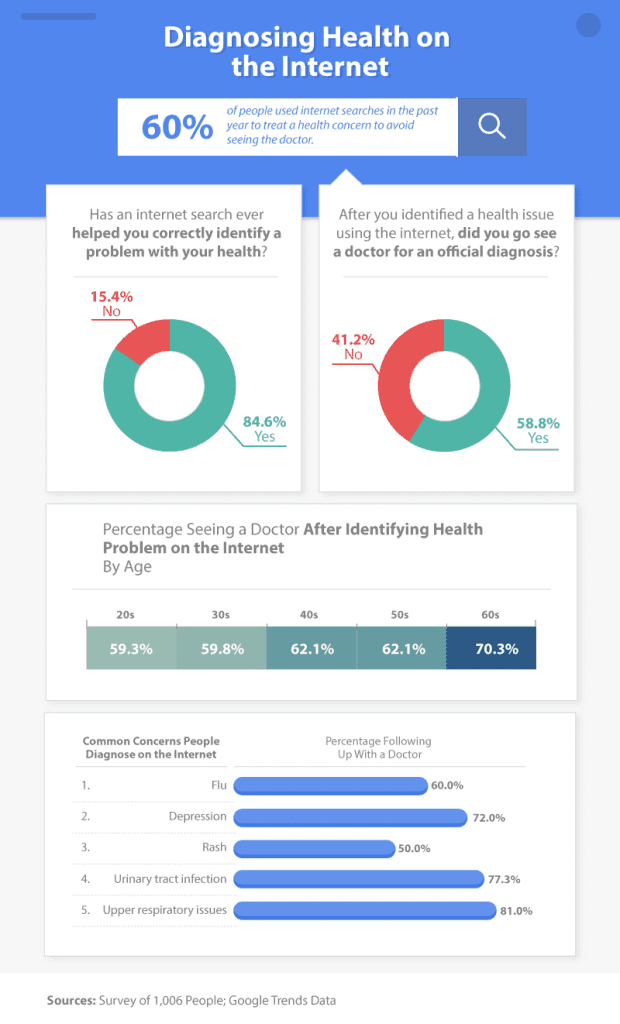
When it comes to finding reliable, accurate health information online, not all digital resources are equal. Medical professionals recommend people rely on government websites (identified as .gov) rather than commercial websites (.com) and to look carefully for bias or conflict of interest during their search. It’s also crucial that online information be current, which means avoiding resources posted more than three years ago. A reputable site will list the credentials of the author, which helps readers discern whether the information is written by a licensed professional.
Nearly 85% of Americans believed the internet had helped them correctly identify a health problem, although less than 59% saw a doctor for an official diagnosis. In fact, people in their 50s and 60s were more likely than people in their 20s and 30s to follow up an online search with a doctor visit. Overall, 60% of people used the internet in the past year to treat a health condition instead of seeing a doctor.
Regardless of how reliable your online information is, certain risks are associated with self-diagnosing over the internet. Internet searches sometimes make patients less willing to consider the advice of their doctors and can negatively impact the time constraints of a traditional visit.
Finding Health Answers Online
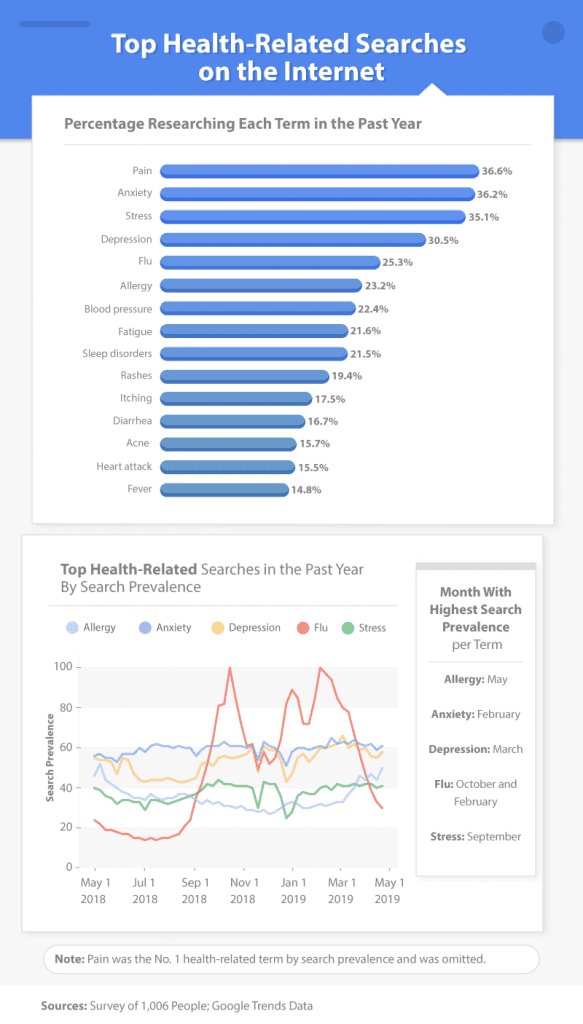
Nearly 37% of people reported using the internet to search for pain issues. One study found that half of Americans experienced pain within three months of the survey, and more than 1 in 10 Americans suffered from daily chronic pain. Across the country, the average number of years people live with debilitating pain is rising, and the opioid epidemic is partially to blame. Conflicting guidance on how and when to prescribe opioids has jeopardized pain management for people with cancer, and an increasing rate of opioid-related fatalities has made some physicians wary of prescribing them at all.
Three mental health-related conditions were also commonly searched topics: anxiety (36%), stress (35%), and depression (nearly 31%). Roughly 1 in 6 adults in the U.S. experience mental health issues, although they may not always be willing to seek professional counseling.
Another 1 in 4 Americans turned to the internet for information regarding the flu – especially prevalent during the colder months. In 2017, the Centers for Disease Control and Prevention (CDC) estimated nearly 900,000 people were hospitalized due to the flu, and more than 80,000 died. Certain demographics are more likely to be susceptible to the flu, including young children, older adults, pregnant women, and people with chronic health conditions.
Regional Concerns for Pain
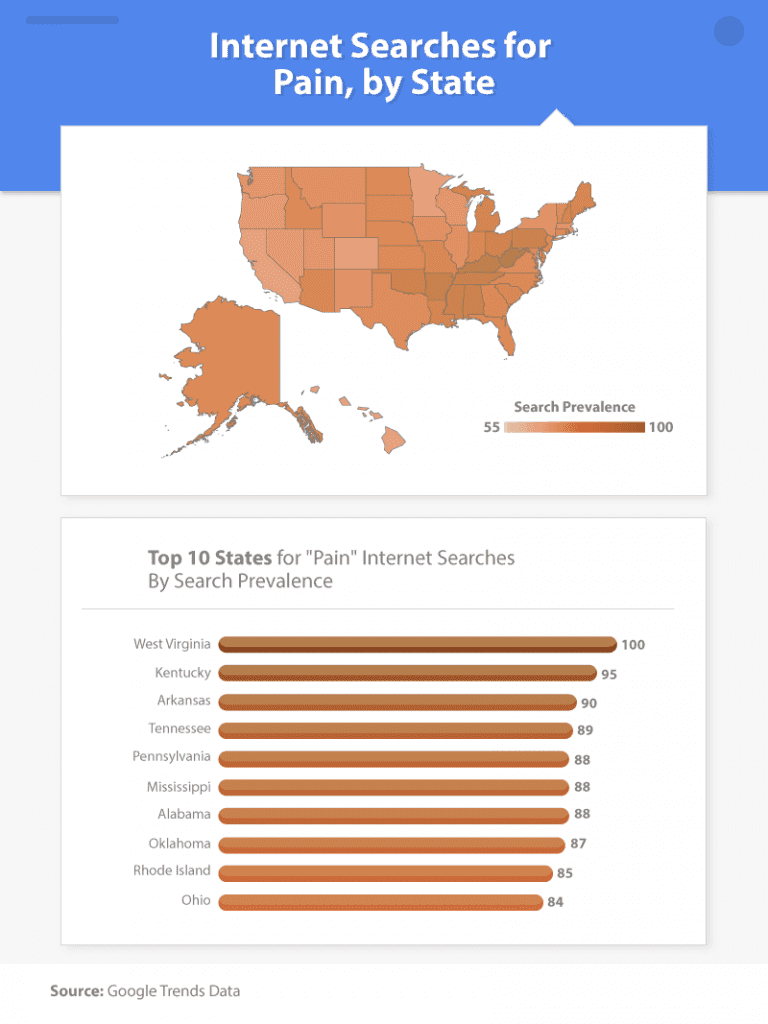
In 2016, roughly 1 in 5 adult Americans suffered from chronic pain, and 8% of adults had high-impact chronic pain, according to the CDC. In 2015, lower back pain was the leading cause of disability in most countries.
Based on our analysis, three states had the highest search prevalence for pain: West Virginia, Kentucky, and Arkansas. With 100 online searches for every 100,000 residents in West Virginia, the state has both the highest volume of inquiries for “pain” and among the highest rate for opioid-related overdose deaths, according to the National Institute on Drug Abuse (NIDA). For patients wanting a nonopioid solution to manage chronic pain, health experts recommend a variety of nonaddictive solutions including cold laser therapy, physical therapy, topical treatments, exercise, and electrical nerve stimulation. While experts recommend additional testing to validate the safety of cannabidiol, CBD is also a popular nonopioid solution to treat a variety of pain conditions.
Missing Links in Health Care
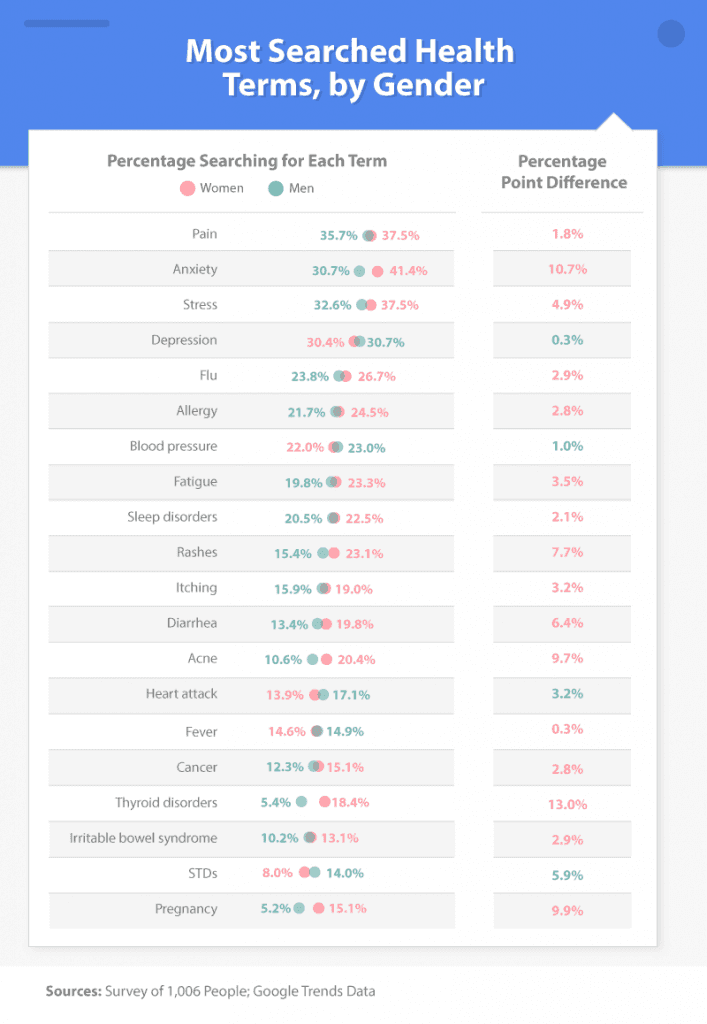
Studies suggest optimal health care favors wealthy white patients in heterosexual relationships, and the shift could be growing wider between male and female patients too.
Medical professionals are less likely to prescribe pain medication to women after surgery compared to men, even though women typically experience higher levels of pain. Similar research goes on to document how women wait longer than men to be seen by their physicians and are more likely to be told their pain is either “psychosomatic” (not real) or influenced by emotional distress. More than 4 in 5 women also believed they experience gender discrimination from their doctors and nurses.
Among the 20 conditions examined, men were more likely to research only four concerns on the internet: depression, blood pressure, heart attacks, and STDs. However, when considering percentage point difference, men and women searched these health terms with most similar frequency: fever (.3%), depression (.3%), blood pressure (1%), pain (1.8%), sleep disorders (2.1%). Overall, women were significantly more likely to search the internet for health information.
Health Concerns, by Age
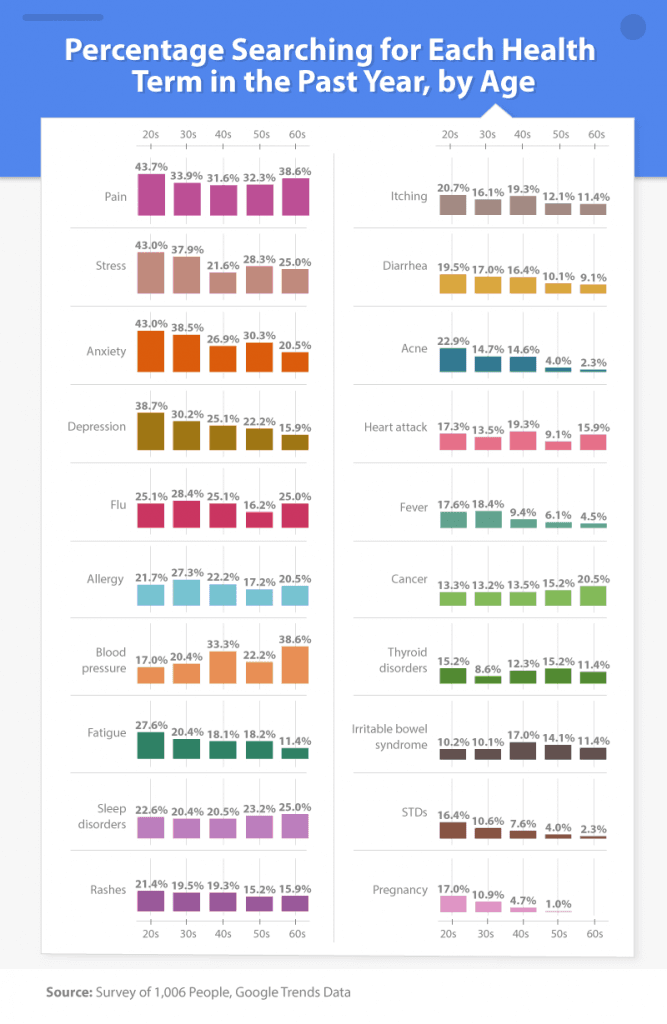
With the right guidance, the internet can be valuable for healthy living. The availability of reliable health sources, a link to medical professionals, and resources on healthy eating and exercise give many people the information they need to make better choices. Millennials, especially, are turning toward healthier lifestyles and that includes preferring online content over doctor visits. They are geared toward online health communities, smart health technology, and internet research.
Particularly where mental health is concerned, people in their 20s and 30s were more likely to lean on internet research than older adults. Forty-three percent of people in their 20s acknowledged looking up both anxiety and stress in the last year, and nearly 39% researched depression. Millennials were also more likely to research conditions including acne, fatigue, STDs, pregnancy, and fevers online compared to older generations. In contrast, people in their 50s and 60s ranked highest for searches including sleep disorders and cancer, while those in their 40s were most likely to research heart attacks and irritable bowel syndrome online.
Mental Health Stigma
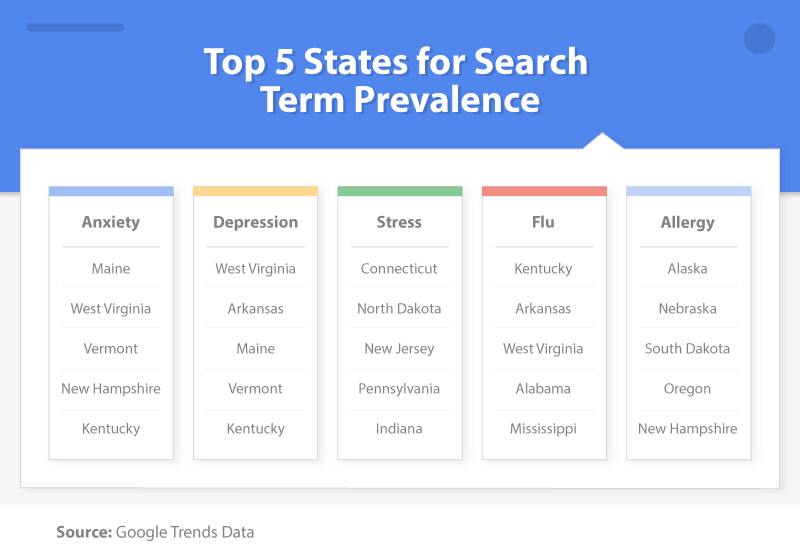
Except for pain-related searches, the most common internet searches in each state were anxiety, depression, stress, the flu, and allergy symptoms. In Maine, West Virginia, Vermont, Kentucky, New Hampshire, and Connecticut, mental health-related searches were the leading inquiry.
Despite the prevalence of mental health conditions, stigma regarding mental wellness still prevents some people from seeking and finding the care they need. While this stigma can be unintentional and subtle, it still makes people more reluctant to seek treatment and creates a lack of understanding around mental health. The internet can provide a positive educational opportunity for conditions like depression and anxiety, but it’s still important to seek proper treatment and connect with other people who may experience similar symptoms.
Finding the Best Resources
Going to the doctor is sometimes much easier said than done. Not only is the cost of health care (including copays and office visits) climbing at an exponential rate, but also it takes time to go to the doctor, fill out the necessary paperwork, and wait to be seen. Instead, an online search is often a far more convenient solution and may even yield quality, reliable information.
Where online research shouldn’t be used for your health concerns is in place of a medical professional’s opinion. Self-diagnosis based on online research can be dangerous and may even lead to misinformation.
Methodology
We surveyed 1,006 people using Amazon’s Mechanical Turk about their health-related searches on the internet in the past year to understand the concerns people researched online. We asked respondents to choose from an extensive list of randomized health issues to see what the most common health problems were and used that data to inform our Google Trends analysis of health term searches by state, as well as year-over-year explorations of health term searches in terms of relative search prevalence. Around 49% of our survey respondents were men, and 51% were women, with ages ranging from 18 to 87. The average age of our respondents was 36 with a standard deviation of 11 years.
Our survey data was combined with Google Trends to create a map of the most common health searches on the internet. Our search term popularity was measured using the Google Trends scale of 0 to 100 that shows the relative popularity of a search term. Using the top five searches on our survey-generated list, we plugged our terms into the Google Trends comparison tool and generated a map based on this scale of relative popularity. We removed the top term “pain” from certain analyses because it dominated search results for the entire U.S. and to find variation.
Fair Use Statement
You’re not the only one who researches odd symptoms online. In fact, 85% of Americans said it helped them identify a health problem. Want to share our study with friends? Feel free to share our study for noncommercial purposes, but link back to us to give us credit for our work.
